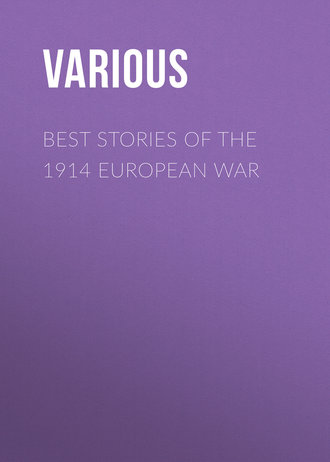
Best Stories of the 1914 European War
SONS IN EACH ARMY
The plight of a Swiss woman is told by a Bordeaux correspondent:
Living at Basel she married a German. Two sons were born to them. Afterward she married a Frenchman and had two more sons. All four of her sons were called to arms, two on each side.
The mother has just received news that all four have fallen in battle.
KAISER IN TEARS AS HE SIGNED WAR ORDER
Kaiser Wilhelm wept when he signed Germany’s declaration of war against Russia, according to Liston Lewis, a lawyer of New York. Mr. Lewis said his information came from one of the highest officials in Germany.
“We reached Berlin on July 29,” he said. “There were stirring scenes there then. The enthusiasm of the people was deep. They were firm in the conviction that England, France and Russia were determined to make an aggressive war on Germany.
“An intimate friend of the Kaiser told me that Wilhelm did not believe such a thing as a general European war possible. He had been told by the German Ambassador in Petrograd that the Russian army was not mobilizing in the West, and had no intention of mobilizing.
“Not until the members of the General Staff put proof of the aggressive movements of the Russian army before him and insisted that he would be responsible for what might follow unless he declared war would the Kaiser believe Russia’s perfidy. Then he asked to be left alone for an hour.
“At the expiration of that time he was found in tears. ‘I can’t do otherwise,’ he remarked as he signed the declaration of war.”
KAISER’S OWN MOVIES
Representatives of the German Government have arrived in Copenhagen with a series of film war pictures taken under the Kaiser’s immediate and personal supervision. These pictures, which already have been exhibited to a private gathering of press representatives, show the bright side of the German army, its appearance when marching and the magnificence of its equipment and organization.
The heroism of the Kaiser himself is shown in a number of heroic attitudes. One picture is headed, “The Kaiser Under Fire,” but it shows his Imperial Majesty as merely looking through field glasses and gives no indication of danger to him. Another shows the Kaiser’s luxurious headquarters, erected at a safe distance behind the firing line, consisting of a number of magnificently furnished asbestos huts, in which his Majesty can live as comfortably and luxuriously as in his palace at Potsdam.
ONE FRENCHMAN DRIVES OFF FIFTEEN
A French private soldier of the name of Baba Couli-Baly of the 45th Infantry has been mentioned for his coolness and accurate rifle fire. While guarding a train of automobiles he put fifteen German cavalrymen to flight.
Second Lieutenant Boquet and Sergeant Major Mercoer of the same regiment have been mentioned in orders for their daring in effecting the capture of a German officer attached to the General Staff who was found making a reconnoissance in an automobile.
SANG FOR THEIR DINNER
Two Americans arrived at Ostend yesterday battered and haggard, but wherever they met Germans the waving of the big American passport secured them politeness.
At Sottegehem they came upon some German officers in a wayside tavern. A lieutenant called for a song in English. One of the Americans obliged with “You Made Me Love You, I Didn’t Want to Do It.”
The lieutenant then said: “If you come from Brussels you must be hungry.”
The officer disappeared and returned with arms laden with ten pounds of butter and a hundred eggs. He then kindly offered to steal two bicycles to relieve them from walking.
GERMAN AIRMEN’S DARING
Two German aviation officers had to land near a Belgian village and were attacked by the local residents, who armed themselves with shotguns. One of the Germans succeeded in seizing the village magistrate as a hostage, and while he kept his pistol at that official’s head his companion repaired the motor. They then made the magistrate mount the aeroplane, which luckily was able to ascend with three passengers, and sped away.
Two other German airmen whose aeroplane was wrecked when it came down were dazed and stunned from their fall. Immediately they were attacked by a group of French peasants armed with pitchforks and scythes. The Germans held these men at bay with their revolvers until they reached the dense woods, in which they hid.
Peasants and soldiers hunted them systematically for days. They spent anxious hours crouching in holes like rabbits, while their pursuers fired shotguns and rifles into every suspicious thicket. They lived on beets and the only water they had was dew, which they sucked from leaves. Their minds almost gave way under the strain and they were burning with fever when a German patrol found them.
PRINCE JOACHIM’S BRAVERY
From an officer who was with Prince Joachim when he was wounded the following description of the incident has been obtained:
“It was during the hottest part of the battle, just before the Russian resistance was broken, that the Prince, who was with the staff as information officer, was despatched to the firing line to learn how the situation stood. He rode off with Adjutant-Captain von Tahlzahn and had to traverse the distance, almost a mile, under a heavy hail of shell and occasional volleys.
“As the Russian artillery was well served and knew all the ranges from previous measurements, the ride was not a particularly pleasant one, but he came through safely and stood talking with the officers when a shrapnel burst in their vicinity. The Prince and the Adjutant were both hit, the latter receiving contusions on the leg, but the shot not penetrating.
“To stop and whip out an emergency bandage, which the Prince, like every officer and private, carries sewed inside the blouse, and bind it around the thigh to check the bleeding was the work of only a moment. It was a long and dangerous task, however, to get him back to the first bandaging station, about a mile to the rear, under fire, and from there he was transported to the advanced hospital at Allenstein, where he remained until he was able to travel.”
CAUSE OF AERSCHOT TRAGEDY
Under date of Antwerp, Sunday, September 20, 1914, the London Standard published the following story from a correspondent:
“When the German troops under General von Boehn entered Aerschot the burgomaster awaited the Germans at the entrance to the town, and to General von Boehn made offers of hospitality.
“The General was gracious enough, and said that so long as everybody in the place showed the quietest demeanor the town and the lives of those in it were safe; if not, the reprisals would be pitiless. The burgomaster offered the hospitality of his own house to the General and his officers, and this was also accepted.
“General von Boehn, with his chief of staff and another officer, took up their quarters under the roof of the mayor. At night the General and his officers dined with the family, consisting of the burgomaster and his wife and their son and daughter.
“The meal progressed with every sign of geniality, and the conduct of the officers was perfectly respectful and normal, but toward the end of the dinner they drank very freely. By the time everybody had retired the three Germans were all very much the worse for drink.
“In the early hours of the morning the members of the household were roused by a shriek from the room occupied by the daughter. The son rushed in and found his sister struggling in the arms of the chief of staff.
“The young man, aroused to a frenzy, attacked the scoundrel. There was a fierce struggle, which ended in the son shooting the chief of staff.
“The tragedy was witnessed by most of the household, but the shot did not arouse the General and the other officer, drunkenly asleep in their beds. The terrified household had to wait until morning for the dénouement of the tragedy.
“The next morning the body of the chief of staff was discovered by the officer. The General was terribly cold in his wrath.
“ ‘The price must be paid,’ he said.
“The burgomaster, his son and two men-servants were put against the wall and shot.
“The carnage in the streets, with burning, hacking and stabbing, followed.”
U.S. TARS SING BRITONS’ HYMN
A correspondent in France describes an incident at Havre when the United States cruiser Tennessee lay in the harbor and a British transport, the decks of which were thronged with soldiers, passed her. The American cruiser dipped the Stars and Stripes, and suddenly the British Tommies broke into “Rule, Britannia.”
“Then,” says the correspondent, “an amazing thing happened. I heard and was thrilled by it. The gallant American sailors took up the rolling chorus – ‘Rule, Britannia! Britannia rules the waves. Britons, never, never, never shall be slaves!’ It was the most perfect act of brotherliness which I have ever witnessed.”
WHOLE FAMILIES WIPED OUT
The Berlin correspondent of the New Rotterdam Courant writes:
“The most gloomy sight to be seen in these days is the advertisements of deaths in the dignified Kreuz Zeitung. The families of officers there make known the blows that have fallen upon them.
“In the last few days this newspaper has published fifty death announcements of officers. Every evening powerful families are extinguished.
“It is endless misery, which is borne with the greatest resignation. An old lady appeared yesterday at the information bureau and had then to learn that her three sons, officers, were all dead, and yet she found strength to bear the blow in her feeling of patriotism.”
“YOU FIGHT DISHONORABLY, SIR!”
An Exchange Telegraph special from Berlin says after the French surrender of Longwy the Crown Prince had an interview with the French commander, who handed over his sword.
Contrary to all military customs, the Prince took the sword and broke it, saying: “I must take your sword, for you fought us dishonorably. Your soldiers used dumdums.”
The French commander replied: “This is the first I ever heard of dumdums being used in the French army.”









